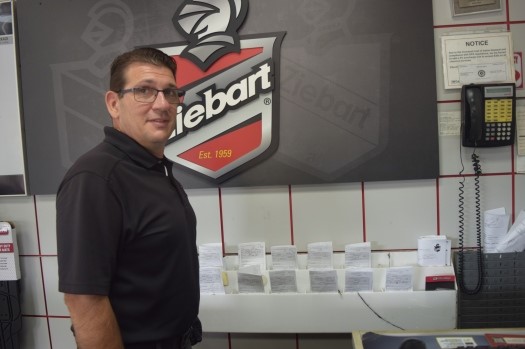Service providers seeing huge sales bump.
The chip shortage has not been good for new car sales but its doing wonders for the automotive aftermarket businesses charged with keeping used cars on the road and looking good.
“I apologize for the wait. What can I do for you?” said Erik Fagan, sales associate at Ziebart of Utica on a recent day when greeted by a reporter.
The Troy-based company is always busy in September and October, when rustproofing becomes an important combatant against salty roads, but the hustle and bustle has been more so than usual of late.
“That’s today’s work,” Fagan said, pointing to at least a dozen invoices covering everything from window tinting and rustproofing to paint protection.

Everybody is taking care of what they have,” said Fagan, who has been in the business for more than 10 years and has never seen it this busy.
“We haven’t even done a full season (of winterizing vehicles) and it’s already been a fantastic year.
That’s just his location in Utica.
According to the 60-year-old company, Ziebart is experiencing record-breaking sales across their entire system of 400 locations and 1,200 service centers in 33 countries. This includes a 300% increase in services like rustproofing and truck bed liners.
Other factors driving the sales is the reduced inventory of cars on dealer lots coupled with a 10 to 28% bump in car prices.
“The prices on new vehicles are exorbitant right now and a lot of people just can’t afford them,” said Gary Jury, a counter salesperson for Neuner’s Automotive Recyclers in Warren and its Scholz Auto Salvage location in Capac.
One of the reasons for the high prices is the global shortage of computer chips, which has forced automakers to temporarily close factories including those that build popular pickup trucks, resulting in a lack of inventory.
General Motors announced Thursday that it was planning to pause production at eight of its 15 North American assembly plants during the next two weeks, including two that make the company’s top-selling Chevrolet Silverado pickup.
Other manufacturers have reported similar cuts, which will compound an already short supply of cars, trucks and SUVs on dealer lots nationwide that have pushed prices to record levels.
Automakers reported that U.S. dealers had just under a million new vehicles on their lots in August, 72% lower than the 3.58 million in August of 2019.
“It now appears to be accelerating in the wrong direction,” said Jeff Schuster, president of global vehicle forecasting for LMC Automotive, a consulting firm.
According to industry analysts the delta variant of the novel coronavirus has hit employees at chip factories in Southeast Asia hard, forcing some plants to close. That’s worsened a chip shortage that was starting to improve earlier in the summer.
“Now the prospects for new sales for the rest of the year continue to dim with the reality that tight inventory will last well into 2022,” said Kevin Roberts, director of industry insights for Cargurus.com.
The demand for trucks, SUVs and other autos is strong, but buyers growing frustrated with the lack of inventory and high prices, are purchasing used vehicles or investing in what they already own.
U.S. light vehicle sales fell nearly 18% in August compared with a year ago, while the average vehicle sale price hit over $41,000, a record, according to J.D. Power.
“We’ve seen an exponential increase in people coming in for used parts,” Jury said.
Just before the pandemic Glenn Neuner purchased Scholz Auto Salvage from its owner, who was retiring and added a 12,000 square-feet warehouse and a five-bay dismantling building onto the site. Since then the facility in Capac has taken off like a rocket ship said Jury.
Customers range from drivers in Macomb County to those living in the Upper Peninsula.
The parts people need to keep their old jalopies on the road is a mixed bag – from alternators and steering columns to front seats to door and hood latches.
“It’s economical, too, because they can buy used parts and get the car fixed for a lot less than it would cost for a new vehicle,” Jury said.
Those who have been able to purchase a new car this year are also taking care of what they have.
“Remember when they used to say that a new car depreciated as soon as you drove it off the lot? That’s no longer the case,” Fagan said.
One of his customers, who brought his new GM Yukon in for window tinting, said he could sell it for $15,000 more than he paid for it because of the demand.
According to the Auto Care Association, the automotive aftermarket is expected to be a $477 billion industry by 2024.
— The Associated Press contributed to this report.
Source: www.dailytribune.com